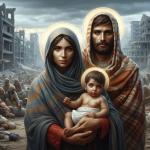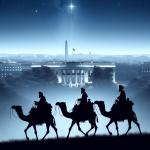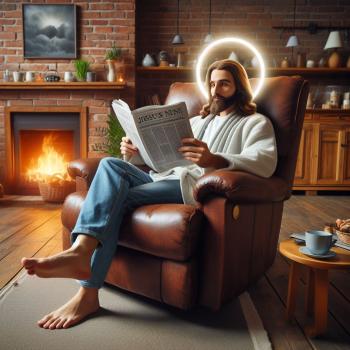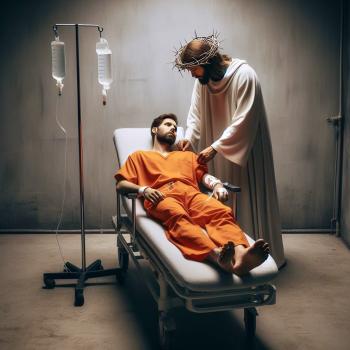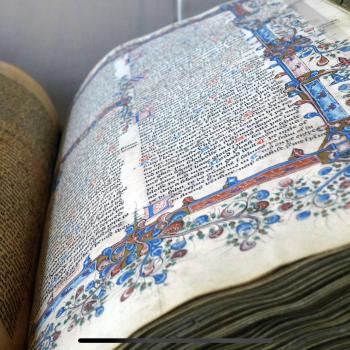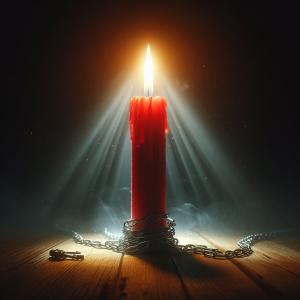
While I love the Nativity story, there are days when I need to hear not of shepherds and wise men, not of stars and angels, but of the God who was there in the very beginning.
The God who with a word created the heavens and the earth.
The God who proclaimed “Let there be light!”
The God who took on flesh and lived among us.
The God who is the light that shines in the darkness, the God that no amount of darkness can overtake.
Not a Typical Nativity
Matthew and Luke have the Nativity stories we’re all familiar with—humble beginnings in a stable with the shepherds and the manger and the Wise Men and all that. Mark skips Jesus’s birth altogether and starts everything off with Jesus already an adult.
But John? John is cosmic. He starts at the very beginning of time, naming Jesus right off the bat as the Word (with a capital W) who was with God but who also was God. The first chapter of John is gorgeous poetry—and it’s big.
In the beginning was the Word, and the Word was with God, and the Word was God. He was in the beginning with God. All things came into being through him, and without him not one thing came into being. What has come into being in him was life, and the life was the light of all people. The light shines in the darkness, and the darkness did not overtake it. (John 1:1-5, NRSVUE)
Some days, when the world seems to be on edge, as though it’s teetering dangerously close to spinning out of control, that’s what I need.
Maybe that’s what we all need.
A Familiar Darkness
We know the darkness, and we need to hear that we have not been abandoned to it. We have not been left to our own devices, to our own will, to our own strength.
Whether it is a pink slip at work, the bottom of a booze bottle, the pang of hunger before bed, the fear of what will happen after a doctor’s diagnosis, the relentlessness of Mother Nature, the betrayal of a loved one, or anything else, we know the darkness.
We’ve experienced the darkness.
The darkness is a very real thing, and no amount of tinsel or wrapping paper can cover that up.
At Christmas, we worship a God who chose to take on flesh and come to us through the upside-down power of humility.
We worship a God who chose a way not of glory, but the way of self-giving love for the sake of the other, the way of the cross.
We worship a God who is the light shining in the darkness.
We worship a God whom the darkness has not overtaken.
Spoiler: We Don’t Control God
I’ve often heard Christians attempt to explain the darkness of sin and evil we see in the world. Many times, the primary argument is that things would be better if we just hadn’t taken God out of the public square or removed God from the schools. This isn’t a message that began recently, either. Every year we hear about the “War on Christmas,” every year we’re warned that if we say “Happy Holidays” instead of “Merry Christmas,” or if the money we spend and the credit cards we max out and the stores we keep open late between Black Friday and December 25 aren’t in honor of Jesus, or if we don’t have a manger scene in the town square, that we will have taken Christ out of Christmas.
The very message of Christmas itself tells us that nothing could be further from the truth. We can’t remove God from anywhere, even if we wanted to. We can’t take the baby Jesus and hide him away, safely out of sight. If our ideas of who God is, what God can do, or what God is doing give us the ability to manipulate God for our own purposes, then they’re much too small for what the first chapter of John tells us.
Jesus is Immanuel, God-With-Us.
The Light Shines
Jesus is the light of the world, and that light shines not in the halls of power, not in the good and proper places where we might otherwise expect, but in the darkness.
It shines in our sinfulness. It shines in our brokenness. It shines in a Bethlehem stable. It shines at the dinner table with prostitutes and tax collectors. It shines with the lepers and the sick and the outcast. It shines on the cross. It shines in the empty tomb.
And Jesus, light of the world, God-With-Us, shines yet today, bringing light to the dark. God cannot be removed from the world God made, the world God loves, and the world God is redeeming. God simply will not be kept out.
That’s the beauty of the story of Christmas. God breaks in. God breaks through.
We don’t act on God, God acts on us. We don’t come to God—God comes to us. We can’t take God out of any part of our individual or societal life, because God is God, we are not…and God has promised to be with us always, even to the end of the age.
And so, according to John, according to what we celebrate at Christmas, according to the Incarnation, we don’t put God anywhere or take God anywhere. God finds us. God comes to us. God comes alongside us in our darkness and doesn’t just shine a light…God is the light. God becomes the light.
The light shines in the darkness, and the darkness did not overcome it.
Finding God in the Shadows
Where we should expect God to be is exactly where we see the shadows, where we see the darkness, where we see the sin and pain and suffering and brokenness in our world. And not because that’s the way we would have it, but because that’s the way God would have it. God is right there in those dark places and in the dark places of our own lives shining the light of God’s own self, the light of Christ, the light of God’s peace, God’s hope, God’s wholeness, God’s shalom dispelling the fear of our own dark nights.
This baby in the manger is the same God who was present at the beginning of time, at the creation of the universe.
This baby in the manger is the same Word who was spoken to Abraham and spoken through the prophets, the Word of redemption and new life and of a blessing for the entire world.
This baby in the manger is the same relentless God who cannot be pushed out or kept back, the God who took on flesh and took on our humanity, the God who was executed by the worldly power of empire.
This baby in the manger is the same Living Word who through his resurrection three days later refused to allow death to have the final word.
This baby in the manger is the same God who refuses even today to let us go, who promises us still that there is nothing in heaven or on earth that can separate us from God’s love.
The light of Jesus shines in our darkness. And the darkness did not overtake it.


